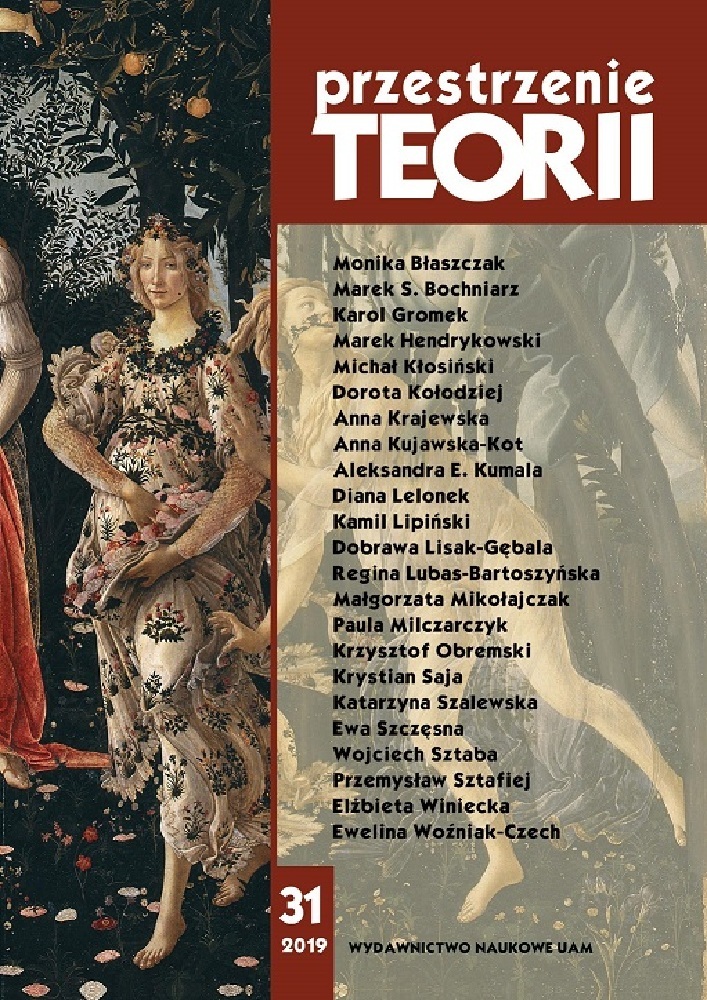Abstract
The paper analyzes the thesis that constantly transgressing boundaries in art is a fundamental principle and essential condition for artistic progress. Crossing external (the art – other discourses) and internal (between various art genres) boundaries is analyzed on the basis of transformations (especially adaptation) and representations. Dialogue relations initialized by art crossing the boundaries are analyzed as well: reinterpretations, polemics, extensions and supplementations. There is also a discussion of the ways in which semiotic and media boundaries are trangressed, especially the semiotic and media borders that are essential for the semiotic sphere of one artistic genre for the semiotic and media sphere of the other. The article refers to examples taken from literature, film, sculpture and painting.References
Balcerzan E., Poetyka przekładu artystycznego, [w:] E. Balcerzan, Oprócz głosu. Szkice krytycznoliterackie, Warszawa 1971.
Baudrillard J., Spisek sztuki. Iluzje i deziluzje estetyczne z dodatkiem wywiadów o Spisku sztuki, przeł. S. Królak, Warszawa 2006.
Bazin A., O film nieczysty – obrona adaptacji filmowej, [w:] A. Bazin, Film i rzeczywistość, wybór tekstów, przeł. B. Michałek, Warszawa 1963.
Choczaj M., O adaptacji, ekranizacji, przekładzie intersemiotycznym i innych zmartwieniach teorii literatury, filmu i mediów, „Przestrzenie Teorii” 2011, nr 16.
Deleuze G., Różnica i powtórzenie, przeł. B. Banasiak, K. Matuszewski, Warszawa 1997.
Eco U., Lector in fabula. Współdziałanie w interpretacji tekstów narracyjnych, przeł. P. Salwa, Warszawa 1994.
Helman A., Adaptacja – podstawowa technika twórcza kina, [w:] A. Helman, Intermedialność w kulturze końca XX wieku, red. A. Gwóźdź, S. Krzemień-Ojak, Białystok 1998.
Helman A., Twórcza zdrada. Filmowe adaptacje literatury, Poznań 1998.
Hendrykowski M., Adaptacja jako przekład intersemiotyczny, „Przestrzenie Teorii” 2013, nr 20.
Hopfinger M., Adaptacje filmowe utworów literackich. Problemy teorii i interpretacji, Wrocław 1974.
Jackiewicz A., Film jako powieść XX wieku, Warszawa 1968.
Jenkins H., Ford S., Green J., Rozprzestrzenialne media. Jak powstają wartości i znaczenia w usieciowionej kulturze, przeł. M. Wróblewski, Łódź 2018.
Markowski M.P., Interpretacja i literatura, „Teksty Drugie” 2001, nr 5.
Miczka T., Adaptacja, [w:] Słownik pojęć filmowych, red. A. Helman, t. 10, Kraków 1998.
Osadnik M.W., Adaptacja filmowa jako przekład, [w:] Kino według Alicji, red. W. Gwóźdź, T. Lubelski, Kraków 1995.
Szczęsna E., Cyfrowa semiopoetyka, Warszawa 2018.
Szczęsna E., Poetyka reklamy, Warszawa 2001, 2003.
Uspienski B., Strukturalna wspólnota różnych sztuk. Ogólne zasady organizacji dzieła malarskiego i literackiego, przeł. P. Fast, [w:] B. Uspienski, Poetyka kompozycji. Struktura tekstu artystycznego i typologia form kompozycji, Katowice 1997.
Wagner G., The Novel and the Cinema, Rutherford–New York 1975.
Wysłouch S., Ekfraza czy przekład intersemiotyczny, [w:] Ruchome granice literatury, red. S. Wysłouch, B. Przymuszała, Warszawa 2009.
Wysłouch S., Literatura i obraz. Tereny strukturalnej wspólnoty sztuk, [w:] Intersemiotyczność. Literatura wobec innych sztuk (i odwrotnie), red. S. Balbus, A. Hejmej, J. Niedźwiedź, Kraków 2004.
Ziomek J., O współczesności retoryki, [w:] J. Ziomek, Prace ostatnie, Warszawa 1994.
License
Authors
Authors of texts accepted for publication in Przestrzenie Teorii are required to complete, sign and return to the editor's office the Agreement for granting a royalty-free license to works with a commitment to grant a CC sub-license.
Under the agreement, the authors of texts published in Przestrzenie Teorii grant the Adam Mickiewicz University in Poznań a non-exclusive, royalty-free license and authorize the use of Attribution-NonCommercial-NoDerivatives 4.0 International (CC BY-NC-ND 4.0) Creative Commons sub-license.
The authors retain the right to continue the free disposal of the work.
Users
Interested Internet users are entitled to use works published in Przestrzenie Teorii since 2015, for non-commercial purposes only, under the following conditions:
- attribution - obligation to provide, together with the distributed work, information about the authorship, title, source (link to the original work, DOI) and the license itself.
- no derivatives - the work must be preserved in its original form, without the author's consent it is not possible to distribute the modified work, such as translations, publications, etc.
Copyrights are reserved for all texts published before 2015.
Miscellaneous
Adam Mickiewicz University in Poznań retains the right to magazines as a whole (layout, graphic form, title, cover design, logo etc.).
